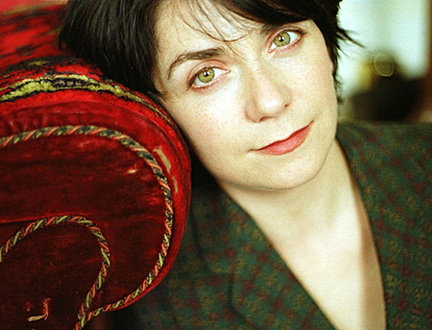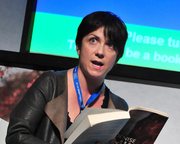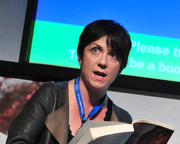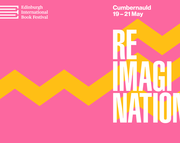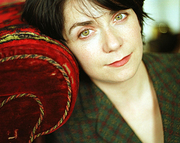We Are All Waiting
By Denise Mina
We have commissioned a new piece of writing from fifty leading authors on the theme of 'Elsewhere' - read on for Denise Mina's new story.
We are very angry for the first hour and a half in the queue. We squash up close to one another, mistrustful of our neighbours. They may try to slip in ahead of us if any angle is left uninvigilated. We do not know one another’s culture.
In front of me stands a man with a Kenyan passport and small goatie beard. He is tall, a full head taller than the rest of us. Between him and I, standing absurdly close, is a small woman in a blue nylon pashmina. She looks rested. She does not look as if it is five am and she is in this queue, an angry irksome queue, full of people who have been standing upright for hours, mentally rehearsing the argument we will have with the representative of the airline when it is our turn to be seen.
A rumour starts at the back, a man tells his wife something in what sounds like Tamil: she remonstrates. People translate and the rumour circulates that there is no one at the desk. We are all waiting to get to an empty desk, hoping to be seen by someone who is not there. But we are all too afraid to leave the queue. If we don’t wait the person behind us might get our seat on the next plane to where we need to go. The rumour reaches the front and a gentle eyed man shakes his head and gives a little smile, no, there is someone at the desk. They are keeping their head down against this room full of angry, demanding faces.
Still we are not moving.
There is water available. In a passenger lounge around the corner, bottles of water and, bizarrely, individual slices of Dundee cake sealed in plastic. The families are lucky. They can send a member off to get the water and cake, while the single travellers are stranded. We can’t even go to the toilet because we will lose our place.
An elderly woman in an airline wheelchair falls asleep. Sad women carry sleeping children, their arms sore, backs aching. Their husbands stare furiously towards the desk, as if through sheer force of will they can conjure a solution.
We can do nothing.
There are six desks on our side of the cavernous white marbled room, an empty corridor fenced by retractable ribbon, and then six desks on the other side with massive queues of their own. Without seeming to move the queues implicate themselves forwards, a millimetre per hour, suspicion and hope propelling us forward. In the space between the two sides of the room a man in a smart suit directs people back into the queues. Waiting is inevitable.
"This is ridiculous,” announces an American man two queues away. He goes off to look for a better solution, to threaten and bargain. Fifty minutes later he reappears at the back of the queue. He took a chance and lost his place.
“This is just the worst service I have ever seen.” A man is behind us and announcing this to the crowd. He is from Glasgow, is camp and is absolutely furious. I look around and make the mistake of catching his eye. “I’m not even going to Brisbane now,” he tells me, “I’m getting them to transfer my flights and I’m going straight home again.”
I smile inappropriately, pretend that the earphones resting in my ears are on, that I am listening to music and I can’t hear him. The skin around his eyes is red because he is so angry. He has a tribal tattoo around his bicep.
“Even the run up to this holiday was a disaster.”
I smile again and look away. The small woman in front of me smiles. She is smaller than me, which is very small. She has dusky brown skin and high cheek bones. She is incredibly pretty.
“Were you here long before me?” I ask, hoping she will speak to me and the angry man will catch someone else’s eye, belong to someone else.
She has been here for twenty four hours. The queue has not moved since she joined it at two thirty am and it is now five. She flew in from San Francisco, from Vegas. She has to get home to Nairobi. Her sister died on Monday. She smiles and her eyes brim a little when she says it. She blinks it away and changes the subject.
Her grief is very different from the woman next to me on the plane from Scotland, a woman with a name as old as the country and a face as familiar as my mother’s. Her husband died in a car crash last year. She was in Yorkshire at the time, with a nine year old nephew who had a brain tumour. She went to another funeral last week as well and all her friends have cancer. Death stalks me on this trip.
My pashmina’d friend and I pass the time complaining about the queue. What are they doing up there? Is there someone there? We complain on behalf of other people: there are women with children here, people in wheelchairs waiting here, old people. We are showing each other that we are good women, because good women never complain on their own behalf.
We plot our revenge. She will never fly through Dubai International again. It’s not the terminal’s fault, I say, but I will never fly Emirates airlines again.
I will.
Some arts administrator working for less than a student grant or a small publishing house will buy my flights and I will not have the heart to make them change it. There was a terrible storm over Dubai, an act of God. No one is to blame.
She works for a health insurance business in Vegas and I ask about the US health reforms. The conflict of loyalties shows in her voice, she whispers to me that the health care is better in Kenya than the US. When she had her daughter she stayed in hospital for six days and they showed her how to do everything. Her girlfriends in Vegas have to leave the next day because they can’t afford it. They all get depressed.
She has been here for twenty four hours but she is lucky because her niece is a stewardess for this airline. She called her in New York and got access to the Executive Service Suite. She slept on a chair and had biscuits and juice. The queue wasn’t here when she first came down. She should have waited.
The men in front shift their weight and I glimpse the front of the queue. Right in front of the desk, leaning ostentatiously on it, is a woman with dyed blonde hair. She is laughing to her friend. She is the only person in the queue who is smiling.
A tired, slight woman in a sari walks up to a small fork in the queue, looking anxiously down to the desk. She is carrying a little girl, asleep, almost as big as she is.
“I think we should get this lady to the front,” says my Nairobi-Vegas friend.
“Absolutely,” I say.
She doesn’t do anything. Even as I step forward I know that this is the pattern of my life: every best friend I have ever had was prettier than me and every one of them was a passive agitator. I am a moral Golem. I wade out into the crowd, ready to incur the wrath of everyone. “Excuse me?” I say to the lady with the child. “Are you waiting alone?”
She nods.
“Excuse me.” I am a fool. “Excuse me, sir?” I am a big fool, the queue is ugly and we are all angry. “I wonder if the people in front would mind very much…” I am touching the elbows of strangers and making an achingly familiar mistake. This will end in a shouty confrontation, possibly in languages I don’t understand. “If you would mind very much if this lady went to the front of the queue since she has a child…”
“No,” says the lady softly, “My husband...” She points to an unlikely man, older, strange ribbed jumper. He’s looking back at us.
“Oh, I thought you were alone.”
“No, but thank you. My husband is..”
The husband looks at her, cross, as if she has reproached him. He waves her back to the seats. I slip back into my place. Every best friend I ever had smiles up at me and I know that I am every big, daft best friend she has ever had. I smile back.
The tall man with the Kenyan passport turns to us. He is wearing a brown suit and a pork pie hat and his skin is the colour of Bournville chocolate. “Madam, you are very kind,” he says. I blush because I tried to be good but made a big show of it, which is worse than not even trying to be good. And because he is so handsome.
Angela from Vegas-Nairobi and I have recognised each other from everywhere and we are now very close friends. Her husband is a hydroengineer. She is used to living in Vegas now but it’s not where she would choose. She likes Oregon and so do I. Angela and I like rain.
I keep her place as she goes to the bathroom to freshen up, and she does the same for me while I go to the loo for a wee.
While she is away I see a man’s head bob in front of the smiling blonde. There is someone behind the desk. They aren’t doing anything, but there is someone there. I tell everyone I saw him but they can’t see him. Some people don’t believe me.
A suspicion forms on our side of the room that queues on the other side are moving. Some people break away, leaving their places and go over to the other side. After a while they all filter back, retaking their previous places, unchallenged.
We have been in the queue for three hours. Some people look for alternatives to just waiting. They stop passing air hostesses in their distinctive uniforms and head scarves. How are we to get to where we are going? People state their cases, say why they deserve extra help: business meetings must be kept, family obligations must be met. The angry camp man will already miss his balloon ride over Brisbane. There’s no point in going now. This holiday was not meant to be. Even in the run up to it he knew he should not have come. He wants someone to ask him about it. No one does.
We have been here for four hours. Her flight is due to leave in two and there are seven people in front of us. I’m so tired I find myself swaying on my feet. My legs ache. My calves are pink from standing. We will never leave this queue.
Angela met her husband in Nairobi. She shows me his photo on her phone, tagged ‘Stud Muffin’. I’m a little disappointed in her.
She has five sisters and four brothers: her father kept trying for sons and getting girls. She is the youngest. Her sisters told her scary things about guys when she was young. Whoever she dated got a hard time coming to the house. We show each other phone photos and pretend to be interested in each other’s children. Really, we are taking turns to talk about our own. We say how hard it is to be away, how they will be allowed to eat pizza every night and watch TV all day. But we are both glad they are not here with us, waiting.
The business class queue is moving. The man dealing with the queue stands on a box and calls over the crowd, “Anymore in first or business class?” He won’t help us, only First class and Business class. Angela shouts that it is not fair and I join in. We shout long after the man has left his post and slipped out of the side door. We shout that it is not fair, we have been waiting, boo! Boo to you! We’re not even angry any more. It’s just a bit of fun.
All around small groups have formed, unlikely groups. A very fat African American man and a tall white Afrikaner woman with no-nonsense-shoes are getting each other water and cake. The man makes a big thing of saying he never eats cake. He makes her eat it. Her phone rings while her mouth is full and she splutters that her battery is about to run out and she doesn’t need a driver now, she will go straight to Bangladesh. She is cut off and tuts accusingly at her phone.
The fat American must get there soon. He cannot be delayed much longer.
Suddenly, “Thank you very much.” It is the blonde woman at the front. She has been served. She has a boarding pass for a flight tucked into her passport, holds it high over her head as she works her way back through the tightly woven queue, she is grinning. Every eye in the room follows her documents. Excitement ripples through the room.
The door to behind the desks opens and an older man in a crumpled suit comes in. We hear the sound of tickets being printed and telephones on speaker phone, perpetually engaged. The older man argues with someone on the phone. The queue is moving.
Angela’s sister was fifty six and died of an aneurism. She complained of a head ache and the next thing she fell into a coma. They operated and she started to respond to reflex tests. They thought she was coming back but the doctors missed another bleed into her brain. Angela says she suffocated. I don’t understand the story but feel it would be rude to ask her to explain.
She asks what I do, and I don’t lie like I usually do, don’t say I’m a waitress or an academic: I tell her I write detective novels and comics. She likes Danielle Steel but will read one of my books and write me about it. Maybe she will come to Scotland with her family. Maybe I will come through Vegas on a tour and we will meet again. I am forty three and I know we won’t meet again. But I also know we are both sincere when we say we would like to.
Angela gets a ticket for Nairobi. She has to run to catch her flight and we hug a warm, fond good bye. I ask her sister’s name and am dismayed to realise that even as I am saying it back I have forgotten it.
The Brisbane man’s queue is moving fast. He overtakes me. As he leaves with his boarding pass he tells me that he is going to Brisbane after all. He can leave in a few hours and he is going to try to have a good time, make the best of it. I doubt him.
I am served by the surly helper, the helper who is no help at all, who has been here with us all this time, not intervening, not helping. He does not make eye contact. He looks tired and browbeaten.
I am absurdly grateful to him. I have only seven and half hours to wait for a new connection. Now I can ascend on the long escalator to the duty-free shops and go and sit and piss at will, I am free to drink hot coffee and eat not-Dundee-cake and almost buy an ornamental gift box of Double Happiness cigarettes thinking they are chocolates.
Thank you very, very much, I say, euphoric that the wait is over, not knowing that the exhausted man has sent my luggage to Mali.
Look, Listen & Read
- 2026 Festival:
- 15-30 August
Latest News
 Major new partnership with Celtic Connections
Major new partnership with Celtic Connections

